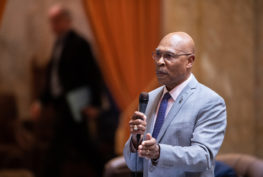OLYMPIA – A bill to eliminate the fees that credit bureaus charge customers who want to freeze their credit reports to protect their personal information is headed to the governor following passage yesterday by the House of Representatives.
The House voted 81-15 in favor of Senate Bill 6018. Sen. Mark Mullet, D-Issaquah, sponsored the bill in response to the Equifax database hack last summer that exposed the private information of more than 143 million Americans.
The bill, which the Senate approved in January by a vote of 46-2, now needs only Gov. Jay Inslee’s signature.
“This bill is an important, bipartisan consumer protection measure that will make it easier for people to protect themselves and their identities without financial penalties,” Mullet, who chairs the Senate Financial Institutions & Insurance Committee, said. “Consumers whose sensitive financial data has been exposed through no fault of their own shouldn’t have to pay to protect their credit ratings.”
Senate Bill 6018 received strong bipartisan support in both the Senate and the House. Rep. Zack Hudgins, D-Tukwila, who chairs the House State Government, Elections & Information Technology Committee and had sponsored a similar bill, helped shepherd Senate Bill 6018 through the House.
“I don’t think it is right that consumers are paying to protect their data when credit agencies are the ones making that data vulnerable,” Hudgins said. “This measure will ensure that all Washingtonians can protect their identities by freezing their credit without paying a fee to do so. It’s the right thing to do.”
Following the Equifax hack, consumer watchdogs recommended that customers request credit freezes from credit reporting agencies to ensure that the stolen information could not be exploited. A freeze blocks access to a credit report, which makes it more difficult for identity thieves to open new accounts using stolen data.
Credit reporting agencies charge Washington residents $10 to temporarily freeze their credit reports. But a consumer who needs to unfreeze the account to generate the credit report necessary to buy a car, take out a mortgage or open a bank account must pay the fee again to each agency, meaning that those who freeze and unfreeze reports with all three major agencies actually face some $60 in fees.
In addition to eliminating credit freeze fees, the bill requires the state to conduct a study on its impact on consumers and credit reporting agencies.



